No Results Found
The page you requested could not be found. Try refining your search, or use the navigation above to locate the post.
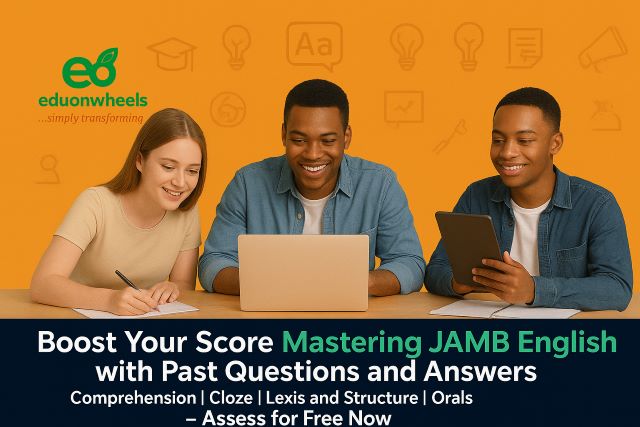
The page you requested could not be found. Try refining your search, or use the navigation above to locate the post.
Are you a JAMB UTME candidate in Nigeria struggling to master the Use of English section? You’re not alone! The English Language paper is a compulsory requirement for all candidates, making it a critical factor for securing university admission across Nigeria. To help you achieve a high JAMB score and ensure your exam success, Eduonwheels offers the best of JAMB exam success guide: our FREE 2021 JAMB UTME English Language Past Questions and Answers.
Stop wasting time searching for unreliable materials. Our comprehensive resource provides authentic 2022 JAMB past questions with detailed, easy-to-understand answers and explanations. Practicing with actual questions from the 2022 UTME is the most effective way to understand the exam’s format, identify your weak areas, and build the confidence you need to ace the test. Whether you’re in Lagos, Abuja, Port Harcourt, or anywhere else in Nigeria, access your free study guide today and take the definitive step towards securing your admission!
You can watch this video on JAMB CBT English 2019 Past Questions 1 – 24 for detailed explanations and solutions to the 2019 JAMB CBT Use of English Language Past Questions.
Ready to ace the Use of English paper? Download your free JAMB UTME English Language Past Questions and Answers for 2011 and boost your exam preparation today!
Questions: Numbered 1 – 60
Fill in the gap with the option that best completes the sentence.
1. Between you and ____________, he is a liar.
A Me
B I
C All of the above
D None of the above
2. The secretary and treasurer did not do ____________ job.
A Their
B His
C All of the above
D None of the above
3. If James fails his examination, his teachers, his parents, his friends, or I ____________ to be blame.
A Are
B Is
C Am
D Not
4. I have always found that it is helpful to have a few wise and trusted people to ____________ you can turn for information and advice.
A Whom
B Who
C Whose
D That
5. We ought to stay away ____________ the robbers come back
A Provided
B Should in case
C Although
D In case
6. It was ____________ who killed the goat.
A His
B Him
C He
D Us
From the options lettered A-D, choose the option that is nearest in meaning to the word(s) (in brackets and italics).
7. Bankole is upset as his wife does not understand his (predicament).
A Sadness
B Dilemma
C Deadlock
D Happiness
8. It is wise not to depend on (mundane) things.
A Imported
B Material
C Attractive
D Expensive
9. Now that the company is (insolvent), it will shut down.
A Overworked
B Unstable
C Bankrupt
D Affluent
Choose the option that has the same consonant sound as the one represented by the letter(s) (in brackets and italics).
10. mo (th) er
A Think
B Teacher
C Breathe
D Watched
11. Wa (tch) ed
A Lived
B Address
C Letter
D Match
12. Na (t) ional
A Sugar
B Raise
C Glass
D Tree
13. foo (t)
A Live
B Vegetable
C Traffic
D Of
Pick out the option with a different rhyme
14. Roar
A Four
B Growl
C Bore
D Roar
Choose the word that has the same rhyme
15. Watch
A None of the above
B Botch
C Catch
D Match
From the words lettered A to D, choose the word that rhymes with the given word.
16. Prison
A Rising
B Risen
C Potion
D Motion
17. Crate
A Great
B Mint
C Creek
D Treat
18. Phone
A Frown
B Grown
C Gown
D Brown
Choose the option that has the same stress pattern as the given word.
19. Student
A Refuse(N)
B Propose
C Rebel(V)
D Superb
Choose the word that has a different stress pattern
20. Embrace
A Suspect(V)
B Member
C Project(V)
D Embrace
21. Project(V)
A Basic
B Suspect(V)
C Neglect
D Project(V)
Choose the option that has a different vowel sound from the others
22. Here
A Beer
B Idea
C Head
D Here
23. Beach
A Ski
B Be
C Been
D Beach
This question is based on Khadijat Abubakar Jalli’s novel, “The Life Changer”
24. What did the author of the book study?
A B.Sc (Ed) Mathematics
B B.A English Language
C B.A Literary Studies
D BSc Political Science
25. The book described Talle as a?
A The precious child
B The quiet one
C The friendly child
D The holy child
26. Who was Omar’s immediate sister?
A Ummi
B Omar
C Salma
D Teemah
27. Ummi’s husband wanted to study law but the providence chose that he study ____________
A Commerce
B Accounting
C Law
D History
28. The full meaning of IPO is ____________
A Independent Police Officer
B International Police Officer
C Investigating Police Officer
D Investigative Police Officer
29. What is Ummi’s Occupation?
A Trader
B Teacher
C Business woman
D Nurse
30. What is Ummi Matric Number?
A UG0001
B UG00001
C UG001
D UG0011
31. What is full meaning of EMEC
A Examination Malpractice and Ethics Committee
B Examining Malpractice and Ethics Committee
C Examination Malpractice and Ethics Convention
D Examination Management and Ethics Committee
32. What is the full name of Salma?
A Salma Mohammed
B Salma Johnson
C Salma Samuel
D Salma Ahmed
33. Who was the narrator of the life changer?
A Salma
B Ummi
C Omar
D Bint
34. How old is Bint?
A 6 years old
B 4 years old
C 5 years old
D 7 years old
35. What question did Bint ask her teacher?
A How to say good morning
B How to say what is your name
C How to say you’re welcome
D How to say that’s very good
36. Who were the people in the car?
A Lawal and Labaran
B Habib and Labaran
C Lawal and Kabir
D Labara and Zarki
37. How much did Habib give Tomiwa personally?
A Ten thousand naira
B Five Thousand Naira
C Thirty thousand naira
D Twenty Thousand naira
38. How much did Tomiwa give her roommates?
A Five thousand naira
B Ten thousand Naira
C Fifteen thousand Naira
D Twenty thousand naira
39. What was Omar’s JAMB exam?
A 230
B 250
C 220
D 260
40. Who introduced the snail delicacy?
A Salma
B Ngozi
C Ada
D Tomiwa
41. “Nothing happened, My friend didn’t feel like giving you her number so she gave you mine instead” Who is the friend?
A Salma
B Ada
C Tomiwa
D Ngozi
42. It might be said that there is some kind of sibling rivalry between
A Teemah and Bint
B Teemah and Omar
C Jamila and Omar
D Jamila and Teemah
43. One reason the narrator had the habit of entering her children’s room unannounced was because
A To monitor their hygiene and tidiness
B To monitor their prayer life
C To check on their welfare
D To keep them studying their books
44. According to the story, one of the following is true
A Tomiwa and Ngozi are neighbours
B Ada and Salma are course mates
C Salma and Tomiwa are rivals
D Salma and Tomiwa are roommates
Passage I
Read the passage below and answer the questions below:
May in Ayemenem is a hot, brooding month. The days are long and humid. The river shrinks and black crows gorge on bright mangoes in still, dust green trees. Red bananas ripen. Jackfruits burst. Dissolute blue bottles hum vacuously in the fruity air. Then they stun themselves against clear windowpanes and die, fatly baffled in the sun. The nights are clear but suffused with sloth and sullen expectations.
But by early June the southwest monsoon breaks and there are three months of wind and water with short spells of sharp, glittering sunshine that thrilled children snatch to play with. The countryside turns an immodest green. Boundaries blur as tapioca fences take root and bloom. Brick walls turn moss green. Pepper vines snake up electric poles. Wild creepers burst through laterite banks and spilt across the flooded roads. Boats ply in the bazaars. And small fish appear in the puddles that fill the PWD potholes on the highways. It was raining when Rahel came back to Ayemenem.
Slanting silver ropes slammed into loose earth, ploughing it up like gunfire. The old house on the hill wore its steep, gabled roof pulled over its ears like a low hat. The walls, streaked with moss, had grown soft and bulged a little with dampness that seeped up from the ground. The wild, overgrown garden was full of the whisper and scurry of small lives. In the undergrowth, a rat snake rubbed itself against a glistening stone. Hopeful yellow bullfrogs cruised the scummy pond for mates. A drenched mongoose flashed across the leaf-strewn driveway. The house itself looked empty. The doors and windows were locked. The front verandah bare. Unfurnished.
But the sky blue Plymouth with chrome tail fins was still parked outside, and inside, Baby Kochamma was still alive. She was Rahel’s baby grand aunt, her grandfather’s younger sister. Her name was really Navomi, Navomi Ipe, but everybody called her Baby. She became Baby Kochamma when she was old enough to be an aunt. Rahel hadn’t come to see her, though. Neither niece nor baby grandaunt laboured under any illusions on that account. Rahel had come to see her brother, Estha. They were two-egg twins. “Dizygotic’ doctors called them. Born from separate but simultaneously fertilised eggs. Estha Esthappen-was the older by 18 minutes.
45. Early in which month did the southwest monsoon break?
A August
B May
C July
D June
46. What rubbed itself against a glistening stone?
A Plymouth
B Wild creepers
C Bull frogs
D Rat snakes
47. Rahel had come to see ____________
A Estha
B Kochamma
C Navomi Ipe
D No one
48. What was Baby’s real name?
A Navomi Ipe
B Estha
C Rachel
D Kochamma
Passage II
Read the following passage and answer the questions below:
Christopher Marlowe, the son of Marlowe who is described as the clerk of St Mary’s in the city of Canterbury, was born in 1564. He received his early education at The King’s School in that city. He took the degrees of B.A. and M.A. in 1583 and 1587 respectively from Cambridge University. He started writing poems and became a renowned dramatist in the Admiral’s Company.
Marlowe is known as one of the university wits, a group of dramatists along with Robert Greene, Thomas Nash, and George Peele. Marlowe is considered the greatest precursor to Shakespeare. When Marlowe came upon the English stage, the nature of drama was undeveloped. The verses in the dramas were lifeless. But Marlowe gave English drama an appropriate metre, diction, and method. It is really a matter of speculation what kind of greatness he would have achieved if his life had not been terminated in a duel after a brawl in a tavern (inn).
The literary life of Marlowe had a short span, from 1587 to 1593. During this period, he wrote five plays which were all tragedies as he had no comic vein. His tragedies like Dr Faustus, The Jew of Malta, and Edward II are rated as some of the best works of the Elizabethan age. He also wrote an unfinished poem Hero and Leander and translated some parts of Ovid’s (a Roman Poet) elegies.
Marlowe’s subjects are mostly heroic which appeals to the imagination of the play-goers. His heroes epitomise the spirit of the Renaissance. Each of them embodies a passion and tries to achieve lies in his development of the blank verse. He put it at any cost. But Marlowe’s chief contribution aside from the old rhyming lines then employed in the plays and used blank verse. Thus, the language of drama was brought closer to real life and drama was made ready for Shakespeare (1564-1616) to improve upon it. It is rightly said, “No Marlowe, no Shakespeare”.
49. When did Christopher Marlowe get his first degree?
A 1587
B 1583
C 1593
D 1564
50. How long was Christopher Marlowe’s literary life?
A 6 years
B 60 years
C 10 years
D 5 years
In each of the following sentences, the word that receives the emphatic stress is written in capital letters. From the options lettered A to D, choose the appropriate answer.
51. John’s watch is made of GOLD.
A Whose watch is made of gold?
B What is made of gold?
C Is John’s watch made of silver?
D Is John’s necklace made of gold?
In each of the following sentences, the word that receives the emphatic stress is written in capital letters. From the options lettered A to D, choose the one which the sentence is the appropriate answer.
52. She WORKS at the hospital.
A Who works at the hospital?
B Where does she work?
C Does she work at the hospital?
D What does she do at the hospital?
53. Aderonke STATED she had a right to her privacy.
A Did Aderonke lament she had a right to her privacy?
B Did Omowunmi state she had a right to her privacy?
C Did Aderonke state she had a right to his privacy?
D Did Aderonke state she had a right to her openness?
54. I only visited Chidi. This means that
A None of the above
B I didn’t do anything aside visiting Chidi
C I didn’t go with anyone to visit Chidi
D I visited Chidi and his friends
55. My account with the bank is in the red. This means that my account is
A Heavy
B In danger
C Overdrawn
D Written in red ink
From the options lettered A-D, choose the option that is most nearly opposite in meaning to the word(s) (in brackets and italics).
56. My father is (parsimonious)
A Thrifty
B Ungenerous
C Frugal
D Generous
57. Last Easter was an (austere) period.
A Harsh
B Severe
C Prosperous
D Sour
Boost your JAMB UTME Use of English score in Nigeria! Get Free Access to thousands of Past Questions and Answers covering all topics like Comprehension, Lexis & Structure, Phonetics, and Antonyms. Start mastering your English exam with Eduonwheels today. Images: 2
You will find in our other Use of English Past Questions and Answers:
JAMB UTME English Language (Use of English) Past Questions and Answers: Repeated Questions 2001 – 2025
JAMB UTME English Language (Use of English) Past Questions and Answers: Topics, including New Topics
JAMB UTME English Language (Use of English) Past Questions and Answers PDF 2001 – 2025
JAMB UTME English Language (Use of English) Past Questions and Answers: Likely Questions 2026 – 2030
Preparatory Tests on JAMB UTME English Language (Use of English) Past Questions and Answers: MCQ
Answers: Numbered 1 – 60
Unlock your success in the 2022 JAMB Use of English exam with free past questions and answers from Eduonwheels. Join thousands of Nigerian students boosting their scores! Images: 3
Answer Explanation Key:
Answer Explanations: Numbered 1 – 60
‘JAMB UTME English Language (Use of English) Past Questions and Answers Free 2021 1: Conquer JAMB English! Get Your Free 2021 Past Questions and Answers Now’
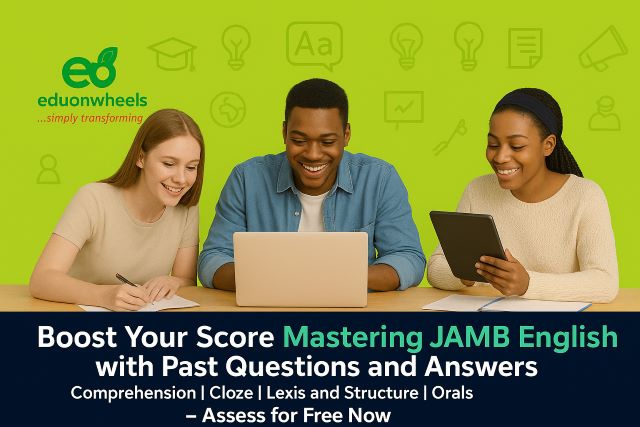






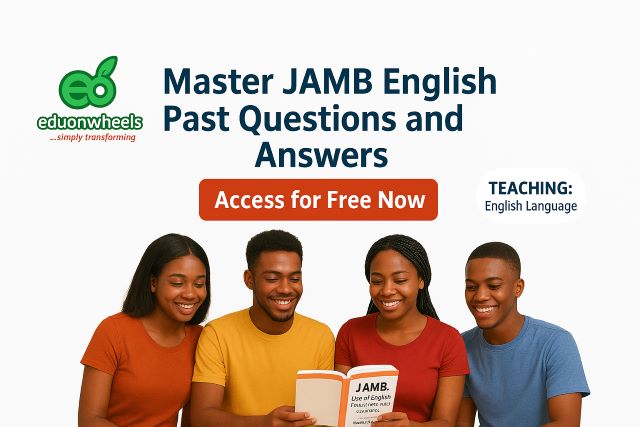
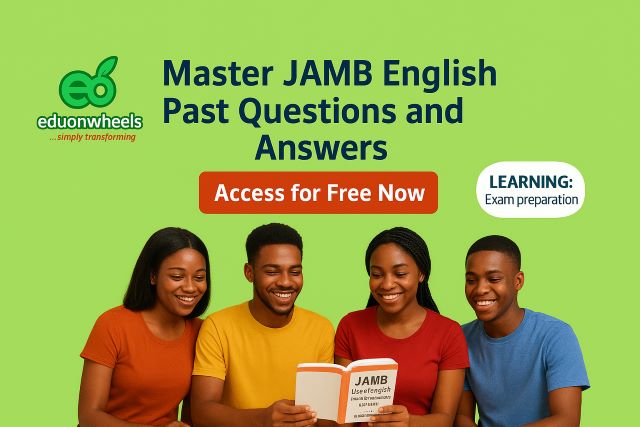
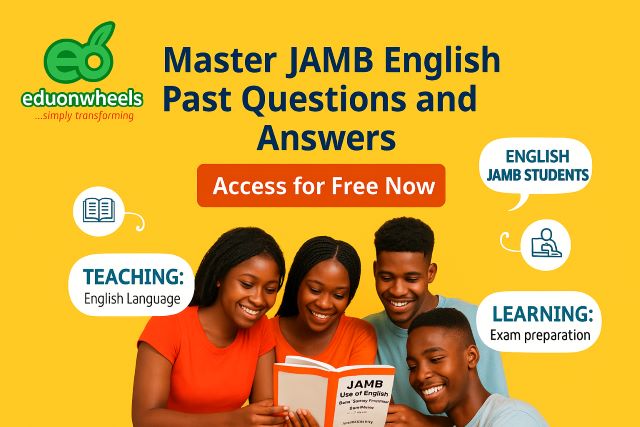
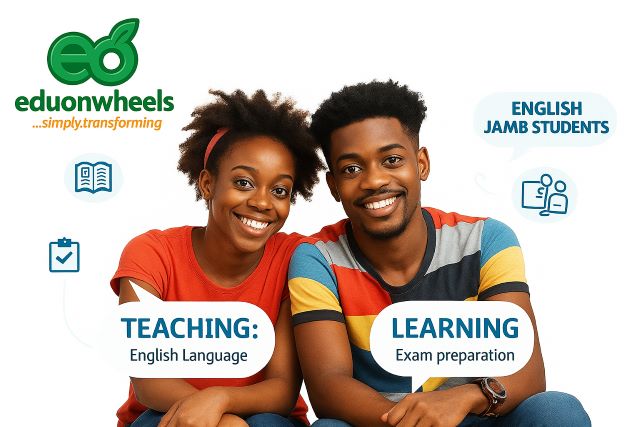




0 Comments